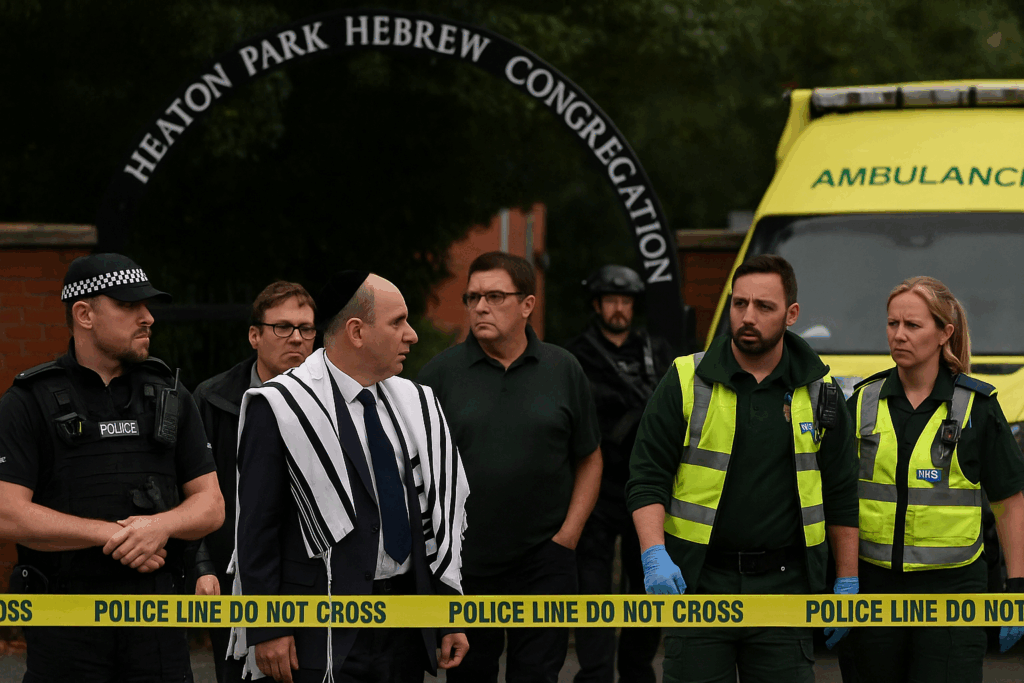A Yom Kippur service turned horrific Thursday morning when a man rammed his car into worshippers and stabbed several outside a Manchester synagogue, leaving two dead and three seriously injured in what police declared a terrorist incident.
Assistant Metropolitan Police Commissioner Laurence Taylor, head of counterterrorism policing, said the assault at the Heaton Park Hebrew Congregation Synagogue in Crumpsall was being treated as terrorism. “Those who have been killed, injured, are at the forefront of our minds, as are their families, friends, and all of those who love them,” Taylor told reporters. “An attack on the Jewish community on Yom Kippur is devastating.”
The suspect, identified as Jihad Al-Shamie, 35, a British citizen of Syrian descent, first drove his car into the crowd before attacking others with a knife. He was shot dead by armed officers seven minutes after the initial 9:31 a.m. emergency call. Police later confirmed he wore a vest designed to resemble an explosive device, though bomb disposal officers determined it was not viable.
Authorities named the victims as Adrian Daulby, 53, and Melvin Cravitz, 66, both local residents—one fatally stabbed and the other struck by a car. Three others remain hospitalized, including one who may have been injured as officers intervened.
Greater Manchester Police (GMP) Chief Constable Sir Stephen Watson said synagogue worshippers managed to bar the attacker from entering the building, preventing what could have been a much deadlier assault. “We can confirm that two members of our Jewish community have sadly died as a result of this attack,” he said. “It will take time to understand the full circumstances.”
Video footage verified by NBC News showed officers confronting Al-Shamie as he lay on the ground outside the synagogue. When the man appeared to attempt to rise, an officer fired a single round. The footage also showed a worshipper wearing a yarmulke lying motionless in a pool of blood only yards away.
Three other people — two men in their 30s and a woman in her 60s — have been arrested on suspicion of planning a terror attack. Metropolitan Police have since taken over the investigation from GMP, underscoring the gravity of the case. Taylor said additional patrols were being deployed to synagogues and Jewish sites nationwide. “We’re deploying all of our capabilities in response to what has happened, and we have resources from across our network involved,” he said.
The incident had immediate political and symbolic consequences. Prime Minister Keir Starmer returned from a European summit in Denmark to chair an emergency COBRA meeting in London. In a televised address, he denounced the attack as targeting individuals “because they are Jews.” Starmer acknowledged longstanding concerns regarding antisemitism and called for a clear response: “It is a hatred that is rising once again, and Britain must defeat it once again.”
Expressions of solidarity poured in. The Israeli Embassy in London said it was “abhorrent and deeply distressing” that such violence was unleashed on “the holiest day of the Jewish calendar, in a place of prayer and community.” King Charles III and Queen Camilla also issued a statement, saying they were “deeply shocked and saddened to learn of the horrific attack in Manchester, especially on such a significant day for the Jewish community.”
The Community Security Trust, a Jewish charity that provides protective services, said it was working closely with the police and congregational leaders. Local lawmaker Graham Stringer called the incident “a dreadful attack designed to damage the Jewish community and damage inter-faith and inter-community relationships.” He added that Mancunians would rally “just as they did after the Manchester Arena bombing in 2017.”
Thursday’s assault marks one of the deadliest antisemitic attacks in Britain in recent years, intensifying concern within a community of fewer than 300,000 Jews in England and Wales. With antisemitic incidents already at record highs, the attack reinforced warnings from Jewish groups that the threat environment has grown more severe since the Israel-Hamas war erupted last year.
For Manchester, a city still scarred by memories of past terror, the attack was another painful reminder that threats remain close to home. For Britain, it underscored the need for vigilance, protection of minority communities, and a reckoning with the resurgence of a hatred as old as history.


